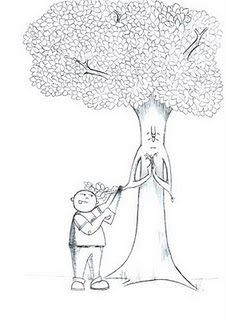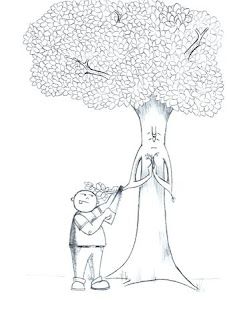 18 de diciembre, 2009
18 de diciembre, 2009
He estado pensando mucho en el asunto que discutimos en nuestro último post (19 de noviembre) y me gustaría presentar algunos pensamientos adicionales que nos ayudarán a profundizar más en el tema.
Con el correr de los años, he visto que nuestro progreso personal y el progreso de nuestro movimiento a menudo terminan estancado debido a nuestra incapacidad de tratar apropiadamente con nuestras emociones negativas respecto a los demás. Por otro lado, también he experimentado como, cuando el resentimiento y otros malos sentimientos muestran sus rostros en el día a día de nuestras vidas, si son tratados con madurez espiritual, entonces pueden modificarse en una fuerza positiva de transformación para todos nosotros. Y de esta manera, nuestro movimiento puede avanzar del modo en que debería.
Si se toman el tiempo de leer nuevamente la cita de Srila Bhaktisiddhanta Saraswati Thakur incluida en el post anterior respecto al perdón, y si lo comparan con el significado de Prabhupada del BG 12.12-13 presentado aquí, verán que buena parte del mensaje es identico. Prabhupada dice: "Un devoto puro nunca es perturbado bajo ninguna circunstancia. Ni es envidioso de nadie. Tampoco un devoto se vuelve el enemigo de su enemigo; él piensa, "Esta persona esta actuando como mi enemiga debido a mis fechorías pasadas. Entonces es mejor sufrir que protestar."
En El Srimad-Bhagavatam (10.14.8) se declara: tat te'nukampam su samiksamano bhunjana evatma kirtam vipakam. Cuando un devoto esta angustiado o ha caído en alguna dificultad, él siempre piensa que es por la misericordia del Señor. Él piensa, "Gracias a mis fechorías pasadas yo debería sufrir mucho, mucho más de lo que estoy sufriendo ahora. Es debido a la misericordia del Señor Supremo que no estoy recibiendo todo el castigo que merezco. Sólo estoy recibiendo un poco por la misericordia de la Suprema Personalidad de Dios." Por lo tanto, él siempre esta calmado, callado y paciente a pesar de cualquier situación angustiosa. Un devoto siempre es amable con todos, incluso con su enemigo.
Aunque he leído muchas veces estas palabras de arriba, cuando llegué a ellas recientemente tuvieron más significado para mí que nunca antes. Quizás necesitaba leer primero la cita de Bhaktisiddhanta Saraswati Thakur para comprender mejor los puntos de Prabhupada. No sólo nos enseñan que la adversidad inflingida por otros proviene de nuestras propias fechorías - y no de los demás - sino también que la adversidad es minimizada en gran parte por la misericordia de Krsna. Por lo tanto, debemos intentar llegar al punto de sentir alivio y gratitud por lo que nos esta sucediendo, no frustración y resentimiento. Justo como cuando un juez nos ayuda a comprender que somos claramente culpables de una infracción, pero nos dice que, por nuestro buen comportamiento, sólo nos cobrará una fracción de la multa que normalmente deberíamos pagar.
Aquí hay otra comprensión valiosa que podemos obtener al ser maltratados u ofendidos. Puede ser difícil de incorporar a nuestras vidas diarias, pero si lo hacemos, seremos capaces de sentir gran alegría y alivio: cuando pensemos en aquellos que nos han demostrado animosidad, debemos intentar sentir compasión hacía ellos sabiendo que su comportamiento hacía nosotros les causará el mismo sufrimiento que nosotros atravesamos ahora debido a nuestro idéntico mal comportamiento en el pasado. Nuestra meta debería ser desechar cualquier resentimiento hacía tales personas y tener simpatía por ellas, satisfaciendo así nuestro mandato de ser un amable amigo para todos, incluso nuestro enemigo.
Nuestro único enemigo, entonces, es el enemigo interior, nuestra propia ignorancia que nos impulsa a actuar y pensar de tantas formas destructivas, causándonos tanto dolor en el futuro. Si reconocemos y focalizamos en eso, nuestra enemistad hacía otros pronto desaparecerá y dejará abierta la puerta de par en par para que el amor llene nuestros corazones, sin importar las acciones de los demás o su mentalidad hacía nosotros.
UNA COMPRENSION MAS PROFUNDA
A DEEPER UNDERSTANDING
 December 18, 2009
December 18, 2009
I have been thinking a lot about the subject matter that we discussed in the last post (Nov. 19th) and would like to present a few more thoughts that could help us go deeper.
I have seen over the years that our personal progress and the progress of our movement is often checked due to our inability to cope properly with our negative emotions towards each other. On the other hand, I have also experienced how, when resentment and other ill feelings show their face in our day-to-day lives, if they are handled with spiritual maturity, they can be turned into a powerful source of positive transformation for all of us. And in this way our movement can go forward as it is meant to.
If you take the time to again read the quote by Srila Bhaktisiddhanta Saraswati Thakur included in the post below on forgiveness, and if you compare it to Prabhupada's purport of BG 12.12-13 presented here, you will see that much of the message is identical. Prabhupada says: "A pure devotee is never disturbed in any circumstances. Nor is he envious of anyone. Nor does a devotee become his enemy's enemy; he thinks, "This person is acting as my enemy due to my own past misdeeds. So it is better to suffer than to protest."
In the Srimad-Bhagavatam (10.14.8) it is stated: tat te'nukampam su samiksamano bhunjana evatma kirtam vipakam. Whenever a devotee is in distress or has fallen into difficulty, he thinks that it is the Lord's mercy upon him. He thinks, "Thanks to my past misdeeds I should suffer far, far greater than I am suffering now. So it is by the mercy of the Supreme Lord that I am not getting all the punishment I am due. I am just getting a little, by the mercy of the Supreme Personality of Godhead." Therefore he is always calm, quiet and patient, despite many distressful conditions. A devotee is also always kind to everyone, even to his enemy.
Although I had read the above words many times, when I recently came across them they had more meaning to me than ever before. Perhaps I needed to read the quote by Bhaktisiddhanta Saraswati Thakur first to bring Prabhupada's points further home. Not only are we being taught by them that adversity brought upon us by others comes about because of our own misdeeds - not theirs - but also that that adversity is being greatly minimized due to Krsna's mercy. Thus we should try to come to the point of feeling relief and gratitude for what is taking place, not frustration and resentment. Just like when a judge helps us understand that we are clearly guilty of an infraction but tells us that, because of our good behavior, he will only charge a fraction of the fine we would ordinarily have to pay.
There is another valuable understanding we can gain from being treated badly or offended. It might be difficult to incorporate into our daily lives, but if we do, we will be able to feel great joy and relief: when thinking of those who have shown us animosity, we should try to feel compassion towards them, knowing that their inimical behavior towards us will cause them the same suffering that we are now undergoing due to our identical ill behavior in the past. Our goal should thus be to cast out any resentment towards such persons and have sympathy for them, thus fulfilling our mandate to be a kind friend to everyone, even our enemy.
Our only enemy, then, is the enemy within, our own ignorance, which causes us to act and think in so many destructive ways, bringing on so much future pain. If we recongnize and focus on that, our enmity towards others will soon go away and leave the door wide open for love to fill our hearts, regardless of anyone's actions or mentality towards us.
